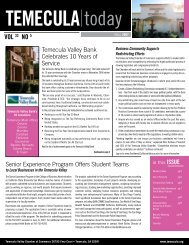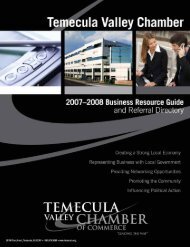CONSTDUCTION GDANT CITy NEWS - Temecula Valley Chamber ...
CONSTDUCTION GDANT CITy NEWS - Temecula Valley Chamber ...
CONSTDUCTION GDANT CITy NEWS - Temecula Valley Chamber ...
Create successful ePaper yourself
Turn your PDF publications into a flip-book with our unique Google optimized e-Paper software.
Tricks to Get More Traffic to Your Website<br />
By Mike Caudill, DRIVEN Media Communications and VYP Media Chair<br />
Wanna know how to get more traffic to your company web site? Well, without<br />
getting too technical, there are a host of things you can do to make your web site<br />
more efficient. Today’s tip is pretty simple. Each page of your web site is being reviewed<br />
by the search engines out there on the internet. Examples of such search engines would<br />
of course be Google, Yahoo and Ask.com. The search engines deploy something called<br />
web crawlers that continually screen your company web site for updates and changes.<br />
When a change occurs, it’s noted with the search engine and increases your ranking,<br />
thus moving your web site up on the search lists. This is important because you want<br />
your customers or potential customers to see you before the competition!<br />
How do you do this? Just add more content to your web site on a routine basis. However,<br />
there is another small trick that will really maximize your exposure. Each page you create<br />
for your web site has a series of words that help the web crawler identify your site. These<br />
key words are what truly help elevate your exposure and ranking. The technical term is<br />
meta tabs, but for the purposes of this exercise…just call them key words.<br />
If you use your cursor (do this now) and right click on a web site, click the properties<br />
button. When the properties come up, click on view page source. Under page source you<br />
will see the word meta on the left side. Next to it are the key words that describe each and<br />
every page on your web site. Use our web site as an example, type in your web browser<br />
Rising Gas Prices Spark New Demand for 4-Day Workweeks<br />
By Marti Fisher, Cal<strong>Chamber</strong><br />
Gasoline in California cost $4.63 per gallon this week, more than double<br />
the price of a year ago, according to the Energy Information Administration.<br />
In addition, traffic congestion is getting worse and Californians are<br />
increasingly looking for ways to clean up the environment.<br />
One strategy that would have a positive impact on household gas budgets, commuter<br />
congestion and the environment would be permitting employees to work alternative work<br />
schedules such as four 10-hour days rather than five eight-hour days in a week.<br />
Alternative Workweek<br />
California law allows an employer to implement alternative schedules for all employees<br />
in a specified work unit by following a series of steps, including holding a secret ballot<br />
election.<br />
Under current Labor Code 511 and following Industrial Welfare Commission wage orders,<br />
employers may institute alternative work schedules if two-thirds of affected employees<br />
agree to the arrangement by secret ballot.<br />
In moving to an alternative work schedule, however, an employer must carefully follow the<br />
rules so as to avoid being subjected to potential lawsuits.<br />
Water, Water, Water...<br />
Action Needs to be Taken Now – Both Governor and Local Assemblyman Agree<br />
California is facing a serious water crisis. After two years of below-average rainfall,<br />
snowmelt runoff and court-ordered water transfer restrictions, Governor<br />
Schwarzenegger has proclaimed a drought in California and is encouraging all of us to<br />
conserve water through the remainder of this year and into 2009.<br />
This crisis highlights the state’s need for a long-term solution to our water supply needs.<br />
It is more important that ever that the Legislature work with Governor Schwarzenegger to<br />
pass a comprehensive plan for the state’s water infrastructure that supplies the water we<br />
drink and fuels our farmers.<br />
That is why Governor Schwarzenegger is leading the effort in our Capitol to pass a water infrastructure<br />
plan. As part of his budget, he has proposed $11.8 billion to invest in water storage,<br />
Delta sustainability, water stewardship, conservation, and water quality improvement.<br />
Help Governor Schwarzenegger put into place a water plan for California that will keep our<br />
faucets flowing and our farmers growing food for generations to come.<br />
Take Action NOW – visit www.JoinArnold.com to email your legislators today and ask them to<br />
work with the Governor to solve California’s water challenges!<br />
California’s farmers and families cannot afford to wait any longer for a real solution!<br />
www.driveontheweb.com. When the site loads, right click on the screen, view page source<br />
and voila…it tells you the meta information.<br />
If you are the one making changes to your web site through a Content Management<br />
System or CMS, it will take you literally five minutes to add information to your meta tabs.<br />
If you don’t use a CMS, then forward this to your Web master and ask them to do this for<br />
you. It might cost, but it’s worth it.<br />
So, that’s today’s tech tip brought to you by the Young <strong>Valley</strong> Professionals. Next newsletter,<br />
tune in and we’ll give you five tips to keeping your car running smoothly!<br />
Each month the <strong>Chamber</strong> will be including<br />
an article from the <strong>Valley</strong> Young Professionals<br />
(VYP) committee. These tips and articles will<br />
be written by the VYPs from their business perspective<br />
and are meant to be useful and interesting<br />
to the entire TVCC membership. To learn<br />
more about VYP visit, www.<strong>Temecula</strong>VYP.org<br />
More information about establishing an alternative workweek schedule is available in the<br />
Cal<strong>Chamber</strong>’s California Labor Law Digest and in Chapter 56, “Alternative Workweek Arrangements,”<br />
of the Division of Labor Standards Enforcement field enforcement manual<br />
at www.dir.ca.gov/dlse/Manual-Instructions.htm.<br />
Although the multi-step process can be challenging and cumbersome, it does present an<br />
opportunity for employers to implement 4/10 schedules to benefit their employees and<br />
their business.<br />
Flexible Workweek Legislation<br />
This year, many local chambers of commerce sponsored AB 2127 (Benoit; R-Bermuda<br />
Dunes), which would have permitted an individual employee in a non-union workplace<br />
to request, and the employer to grant, an alternative workweek schedule without going<br />
through the election process.<br />
More Information<br />
Information on how to implement an alternative work schedule in accordance with the<br />
current requirements is available on the Cal<strong>Chamber</strong>’s HR California website.<br />
Assemblyman Kevin Jeffries (R-Lake Elsinore) applauds Governor Schwarzenegger for signing<br />
an executive order declaring a drought and calling for concerted state action to conserve<br />
water and better coordinate efforts by local water districts and agencies to deal with water<br />
shortages. “I would like to thank the Governor for his continued focus on the current and<br />
long-term shortages of water in California. Two of the areas hit hardest by this drought<br />
are the Inland Empire and Northern San Diego County, both within my district. I welcome<br />
these efforts by the Governor to expedite the release of previously approved bond funds to<br />
local districts to aid in conservation, recycling, and groundwater storage efforts,” said Assemblyman<br />
Jeffries.<br />
San Diego County’s critical agriculture industry has also already been hard hit with increased<br />
water rates and a mandatory 30% cut in agricultural water usage. Jeffries commented,<br />
“as avocado, citrus, and grape growers are forced to stop farming by these drought<br />
restrictions, we will see these orchards and vineyards replaced by homes and other developments<br />
that will only use more water. We need to recognize that we are all in this water<br />
shortage together, and must work cooperatively to increase the supply of water in California<br />
so that we can preserve our economy and our way of life.”<br />
<strong>Temecula</strong> Today | July 2008 p11







